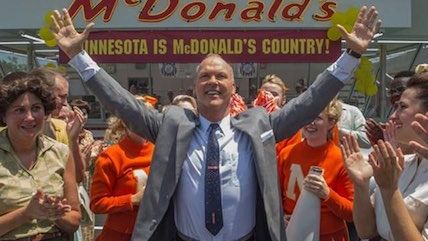Movie Review: The Founder
Michael Keaton in a McDonald's burger biopic.


As Ray Kroc, the not-exactly founder of the McDonald's hamburger empire, Michael Keaton gives off some of the mad-hustler sizzle of his old Beetlejuice character. We first meet Kroc in 1954, delivering staunch motivational clichés directly into the camera as he prepares to begin another day as a traveling salesman slogging around the Midwest peddling commercial milkshake machines that nobody seems to want to buy.
Kroc's life takes a fortuitous turn when he receives an order for not one, but six of these machines. Oddly, the order is from a little burger hut in San Bernardino, California, called McDonald's. It's run by two straight-arrow brothers, Mac and Dick McDonald (John Carroll Lynch and Nick Offerman), who, as Kroc soon discovers, are onto something. Driving straight out to Cali, he finds their tiny operation doing around-the-block business—and he immediately understands why.
Drive-in restaurants are already popular—places where people (especially teenagers) can park their cars in a slot, place an order with a roller-girl waitress, and then wait for their food to be brought. But the wait is usually long, and often wrongly assembled when it arrives. This is not the case at McDonald's. Here, customers walk inside to place their orders themselves, and then wait about 30 seconds for their grub to be handed over in a paper bag. This swift service is made possible by the McDonald brothers' assembly line approach to food delivery. They've eliminated all culinary distractions—no tacos, no fried chicken—and sell only three things: burgers, fries and drinks. They've built special automated machinery to squirt condiments on their buns—to be joined by exactly two pickle slices per burger—and have even choreographed the duties of their kitchen employees.
The sequence in which we see all of this burger knowledge being dropped is pure suburban Americana, with clean-cut moms and pops and cheerful offspring biting into their hamburgers with looks of swooning transport on their faces. It's all ripe for standard Hollywood mockery, but director John Lee Hancock (who also gave us the Walt Disney biopic Saving Mr. Banks) doesn't quite play it that way. We realize that the grownups we're seeing are people who've come through the Depression and then the war, and are now grateful to have a place they can go out to and share a meal without busting their modest budgets. (The McDonald brothers' burgers are priced at 15 cents each.)
Ray Kroc is knocked out. He tells the brothers their burger concept cries out to be franchised—and he's just the guy to help them take it nationwide. The McDonalds are skeptical. They've already made some attempts at franchising (one of their satellite operations over in Phoenix also incorporates a design element they call "the golden arches"), but quality control—about which they're obsessive—has proved to be a major problem. Kroc doesn't care what they've tried before. He signs a contract with the brothers to become their franchise master—although on a very short company leash.
The McDonald brothers are the heart of the movie. As Lynch and Offerman play them, they are the most guileless of entrepreneurs. They've come up with a great idea, but they're too cautious—and too committed to their high standards—to take it to another level. This makes them perfect prey for a hustler like Kroc—a man who's not without standards of his own, but is also a guy who's beginning to embrace his inner shark. (Before long he's handing out business cards that describe him as the company's founder.)
There's a compelling tension in the movie between Keaton, who's among the most likable and fascinating of actors, and the character he's playing, who's charming at the outset, but soon starts going dark. Kroc is a true believer in the wonders of capitalism (pitching prospective franchisees, he tells them, "Put your arms around the American dream"), but he has a tenuous allegiance to moral norms. He coldly casts aside his supportive wife (Laura Dern, given little to do but look glum) to take up with another man's spouse, a natural biz whiz named Joan (a luminous Linda Cardellini). And he has no reluctance at all about using a kind-of-brilliant real-estate strategy to try to pry the McDonald brothers out of their own business. ("Contracts are like hearts," he tells them. "They're made to be broken.")
By the end of the movie, the Ray Kroc depicted in Robert Siegel's script (this is one of those "based on a true story" pictures) seems to be an almost complete bastard. That we don't completely hate him is a tribute to Keaton. He's an actor who could probably sell us anything.


Show Comments (38)